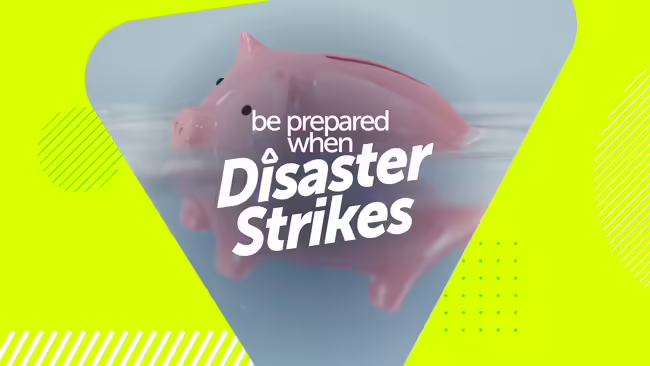
Financial Emergency Preparedness | August 29 @ noon
Many financial problems occur after a disaster or emergency. These issues can further disrupt your finances and your sense of normalcy. Financial emergency preparedness aims to help people prepare, recover, and rebuild after disasters and emergencies. In this session, you will learn ways to organize and manage your finances, develop valuable resource lists, and ways to reduce anxiety and stress. You will explore financial processes such as making a plan to document financial information and contacts before an emergency, taking care of the most urgent financial issues first, and watching out for financial fraud following a disaster. Finally, you will explore resources to help them build or rebuild your financial preparedness toolkit.
If you need a reasonable accommodation to participate, please contact Kristin Bogdonas at kmbogdo@illinois.edu. Early requests are strongly encouraged to allow sufficient time to meet access needs.
Explore Additional Webinars in the Be Prepared When Disaster Strikes Series
Knowing where to begin with an emergency preparedness plan can be overwhelming and time-consuming but being prepared can also save lives. The Be Prepared When Disaster Strikes webinar series is designed to equip individuals and families with the information they need to stay safe during and after a disaster.
Emergency Kits and Communication Plans | August 1 @ noon
Do you have an emergency kit ready to go? The Federal Emergency Management Agency (FEMA) recommends that individuals and families prepare to be on their own for at least 72 hours after a disaster occurs. Being prepared by having an emergency kit and a family communications plan can help alleviate some of the stress that results during such a situation In this session, you will learn about the recommended items that should be included in every basic emergency kit and how to plan for the unique needs of your family. Additionally, you will also learn how to develop a practical family communications plan that will allow you and your family to manage and maintain contact during a disaster scenario.
Building an Emergency Food and Water Supply | August 8 @ noon
When emergencies occur, it could be days or weeks before power is restored. Tornadoes, floods, fires, blizzards, pandemics, and earthquakes all present a risk to a safe and secure food supply in Illinois. Having an emergency supply of food and water on hand is important to keep you and your family fed and hydrated until help arrives. In this session, participants will learn how to build this emergency supply and techniques to extend shelf-life of food.
In addition to having enough food, it’s equally important to have safe food and water. There are certain precautions to take to ensure food safety during and after a disaster event. Food safety measures such as temperature control, sanitation, and shelf-life will be highlighted with special considerations after a power outage, flood, and fire.
The Impact of Hunger and Health in Disasters | August 15 @ noon
Feeding America defines food insecurity as a lack of consistent access to enough food for every person in a household to live an active, healthy life. In the United States, 10.5 percent of households were food insecure at least sometime during the year, including 3.9 percent that had very low food security (USDA, 2020). Due to COVID-19, individuals and families who haven’t faced food insecurity previously, are standing toe-to-toe with it. Hunger doesn’t discriminate. Many people in America are just one job loss, illness, or missed paycheck, away from hunger. There are many local, statewide, and national programs available to assist in meeting the needs of the population in an emergency. In this session, participants will learn about food insecurity, the health impacts of food insecurity, and how to identify emergency food assistance programs and resources.
Tree Management Before and After a Disaster | August 22 @ noon
Wind, ice, and snow are environmental forces that can inflict damage on trees of all sizes and species. Dynamic forces of wind may twist or whip tree canopies to the extent that interior, structural wood is damaged. Ice and snow load can add weight to limbs beyond the holding capacity causing branch failure. Storm-damaged or injured trees should be treated with caution until a complete and thorough examination by a professional arborist is conducted. In this session, participants will learn what actions can be taken to prepare trees to be more resistant to storm damage, what professionals should be contacted in the event of a downed tree, and how to protect themselves during the initial aftermath. Trees are large, beautiful pieces of infrastructure in our environment. Preparing to care for trees before and after natural disasters can help preserve trees and protect people.
Financial Emergency Preparedness | August 29 @ noon
Many financial problems occur after a disaster or emergency. These issues can further disrupt your finances and your sense of normalcy. Financial emergency preparedness aims to help people prepare, recover, and rebuild after disasters and emergencies. In this session, you will learn ways to organize and manage your finances, develop valuable resource lists, and ways to reduce anxiety and stress. You will explore financial processes such as making a plan to document financial information and contacts before an emergency, taking care of the most urgent financial issues first, and watching out for financial fraud following a disaster. Finally, you will explore resources to help them build or rebuild your financial preparedness toolkit.